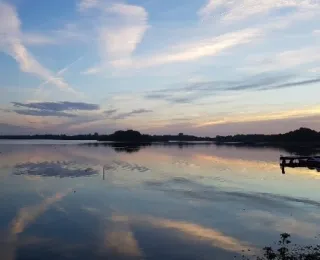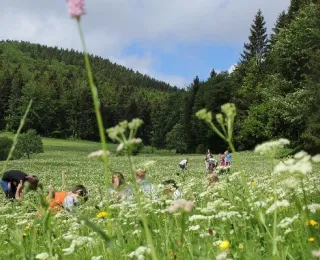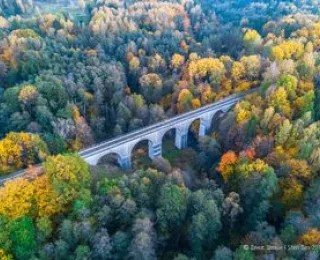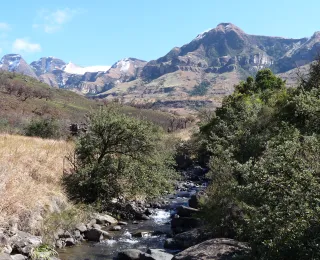UNESCO Biosphere Reserves
UNESCO Biosphere Reserves
The UNESCO Man and the Biosphere (MAB) Programme is an interdisciplinary programme that was introduced in 1970. It is the first global programme to explore the relationship between humans and the environment. Biosphere reserves are the central instrument in the MAB Programme. They serve as model regions to explore sustainable management practices in meeting both human and environmental needs. The idea is to address social and economic issues, conserve biodiversity and ecosystem functions, and preserve characteristic cultural landscapes.
The German MAB National Committee
The German MAB National Committee secretariat is located at BfN. BfN works with the National Committee and other national and international stakeholders to implement and further develop the UNESCO MAB Programme in Germany, and on projects conducted in the World Network of Biosphere Reserves.

Implementing the MAB Programme in Germany
Criteria for the Recognition and Review of UNESCO Biosphere Reserves in Germany
In order to adequately implement UNESCO guidelines in Germany and to comply with various obligations under international law, the German MAB National Committee first adopted “Criteria for the Recognition and Review of UNESCO Biosphere Reserves in Germany” in 1996. These criteria were last revised in May 2025. Based on these criteria and always in conjunction with UNESCO's international guidelines, the MAB National Committee reviews the Federal States' periodic review reports on the development of existing biosphere reserves every ten years. The criteria are also binding for applications for the recognition of new biosphere reserves.
Quality assurance in German biosphere reserves – Further development of criteria, recommendations and implementation strategies
Implementing sustainable development as a model – That is the main task of the transition area in biosphere reserves. As part of an R&D project, an indicator set was developed which can be used as the basis to describe and evaluate both sustainable management and sustainable development of biosphere reserves. This underpins developed assessment questions and parameters with measurable characteristics. The results were published in the form of a practice guide.
Sharing experience under the UNESCO MAB Programme
Projects to foster experience sharing
In various projects and seminars, biosphere reserves and their stakeholders are brought together to assist the creation and expansion of biosphere reserves, strengthen international cooperation, foster exchange and benefit from shared expertise and experiences.
The German MAB Youth Forum brings together committed young people who live and work in biosphere reserves. In addition to networking and exchange on topics involving biosphere reserves, the four-day event also focuses on developing own project ideas. In workshops and excursions, participants work together to deepen their specialist knowledge and learn about sustainable management practices and lifestyles that can play an important role in biodiversity conservation. The 3rd MAB Youth Forum took place in the Palatinate Forest-North Vosges biosphere reserve from 22 to 25 September 2023.
The multi-day conference series fosters exchange between European biosphere reserves on current topics of relevance. Between 2019 and 2022, biosphere reserve managers and practitioners and scientists met in three workshops on insect conservation, participation and climate neutrality in biosphere reserves. The next workshop will be held at the start of 2024 and will focus on the topic of research in biosphere reserves.
More than 100 early career scientists, research managers and other experts from 46 countries met at the international conference held at the Schorfheide-Chorin biosphere reserve in May 2022. They exchanged views on current research and developed ideas on how to give more focus to science and research under the UNESCO MAB Programme. For example, the Eberswalde Declaration drawn up by the conference participants recommends, among other things, heightening awareness of biosphere reserves as attractive research fields and study areas, improving availability of data and intensifying exchange of research results.
The aim of the BRConnect project was to provide support for German biosphere reserves in establishing and expanding international relations. This included conducting a needs assessment, organising a workshop and compiling an extensive guide along with multilingual communication materials.

Projects as part of bilateral cooperation
INTERNATIONAL COOPERATION AND SUPPORT FOR GERMAN BIOSPHERE RESERVES
Long-standing international partnerships such as the one between Germany’s Lake Schaalsee biosphere reserve and the Lake Bosomtwe biosphere reserve in West Africa transform the World Network of Biosphere Reserves into a platform for global exchange between experts with deep roots in their respective regions. BfN assists cooperation between German biosphere reserves and other biosphere reserves in the World Network.
As part of international cooperation between biosphere reserves in Germany and those in the World Network of Biosphere Reserves, a cooperation partnership has evolved between biosphere reserves in the German state of Brandenburg and the Lake Indawgyi biosphere reserve in Myanmar. Lake Indawgyi is the only fresh water lake in Myanmar and is of international importance for biodiversity conservation and in protecting the livelihoods of tens of thousands of people. The project focuses on providing support for the Lake Indawgyi biosphere reserve in the areas of capacity building, lake monitoring, river connectivity and dealing with the impacts of illegal gold mining.
The UNESCO Biosphere Reserve Lake Bosomtwe was designated by UNESCO in June 2016. The site is characterised by Lake Bosomtwe itself, Ghana’s largest natural lake, which is of importance for recreation and also has spiritual significance. The Schaalsee biosphere reserve was designated as a UNESCO biosphere reserve in 2000. It is largely characterised by Lake Schaalsee itself. There are many similarities and parallels between Lake Bosomtwe Biosphere Reserve and Schaalsee Biosphere Reserve. Therefore, for some years now, the two sides have worked to establish a long-term cooperation built on common interests.
Through the expansion of the UNESCO biosphere reserves Central Balkans and Thuringian Forest, new topics and stakeholders became relevant for sustainable development. In a joint workshop on “participation in biosphere reserves”, representatives from both areas exchanged views and ideas, and intensified their cooperation efforts. Among other things, this called for reflection on previous participation processes that had already taken place in the extended areas. Knowledge on quality standards for successful participation was also needed to ensure compliance with those standards while taking regional conditions into account. The partnership was sealed with a declaration of intent.

BfN activities in the World Network of Biosphere Reserves
PROJECTS IN THE WORLD NETWORK OF BIOSPHERE RESERVES
In addition to assisting international cooperation activities of German biosphere reserves, BfN also provides support for other countries in implementing the UNESCO MAB Programme. The focus of this work includes identifying suitable areas, preparing nominations for their designation as a UNESCO biosphere reserve and assisting management and capacity building on site.
Several years ago, as part of the annual Kaliningrad Environmental Days (Umwelttage) introduced back in 2002, the possibility was explored of Germany providing support to enable sustainable regional development in the Kaliningrad region. Initial feasibility studies and zoning proposals for the development of a large-scale protected area in the Romincka Forest have been available since 2007.
In a project completed in August 2022, teams of German and Russian specialists and stakeholders worked together to support in particular the Wystinets Nature Park with the nomination of the Russian section of the Romincka Forest as a UNESCO biosphere reserve. They produced nomination dossiers for the Russian Federation to submit to UNESCO and developed a management plan for the conservation and sustainable development of the future biosphere reserve. There being no biosphere reserve in the Kaliningrad region to date, the nomination would represent a significant step in strengthening Kaliningrad’s integration into UNESCO’s international “Man and the Biosphere” (MAB) Programme.
By providing support in developing a management manual for biosphere reserves in Africa, BfN played an important role in making it easier for practitioners to implement the UNESCO MAB Programme. The comprehensive manual was jointly compiled by a team of African experts and the German Commission for UNESCO. It contains a wide range of helpful suggestions and recommendations concerning concrete management issues, such as sustainable resource use, risk and conflict management, planning and participation.
As model regions for sustainable development, biosphere reserves can play an important role in achieving the 17 Sustainable Development Goals (SDGs). By protecting nature in the core areas of biosphere reserves, natural resources can be conserved now and for future generations. Nature-friendly, income-generating measures in the transition areas of biosphere reserves and in educational programmes provide perspectives, especially for young people. In close collaboration with African partners and the German Commission for UNESCO, BfN assists both the establishment and management of biosphere reserves in southern Africa.
